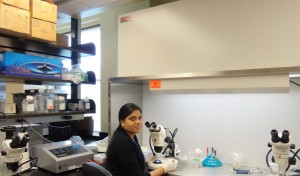In 2009, Chandrakala Puligilla, a young biomedical researcher who studies cell fate specification in mammals, won the prestigious K99 award—the postdoctoral half of the prestigious transition award from the National Institutes of Health (NIH)—on her first attempt. In 2011, she became an assistant professor at the Medical University of South Carolina and secured the award’s matching second half, an R00 research grant that provides up to 3 years of research support.
Though off to an excellent start, Puligilla must now cement her gains and keep her lab funded by securing a full NIH research grant: an R01. She is feeling pressed because her favored “early-career investigator” status runs out later this year, and her first R01 application, submitted last June, wasn’t funded. The feedback from her first R01 proposal came in a month late because of last year’s federal government shutdown; still, she incorporated changes and met the resubmission deadline. She’ll find out how she did this summer—but she is already breathing a little bit easier because, thanks to a new resubmission policy, this won’t be her last chance to win NIH funding to work on this research idea.
Two strikes, you’re no longer out
Before 2009, researchers had three shots at convincing their study section (an NIH panel that reviews grant proposals) to fund their work. There was the initial application (dubbed A0 by NIH), the first amendment (A1), and the second amendment (A2), the end of the line. Then, in 2009—the same year NIH introduced “early-stage investigator” status—the A2 went away. Starting that year, a young principal investigator (PI) who was deeply invested in a scientific idea had just two shots to get it funded. In mid-April of this year, NIH changed that policy fundamentally.
Sally Rockey, NIH deputy director for extramural research, explained in a press call that the “two-strikes” policy was meant to reduce the average time between applying for a grant and receiving funds. The queue was indeed shortened as a result of the change, but it also meant that some researchers were forced to abandon a line of research when their first amendment failed, leaving them scrounging for alternative, potentially fundable research ideas.
Read the entire article. html. pdf.
